
The Trump-era American Right has carried within it largely hidden but quite massive internal conflicts that have finally exploded into public view. It was long past time for these unsustainable – and glaringly self-negating – doctrinal inconsistencies to be fully aired and confronted.
Exactly that is finally happening in the wake of the Biden administration's steadfast, unlimited financing and arming of Israel's war in Gaza, including Biden's request for an additional $14 billion for Israel's war, on top of the billions Israel automatically gets each year from the U.S. While Biden officials periodically leak statements of "concern" about the number of civilians Israel is killing in Gaza, largely to assuage their increasingly angry voting base, they have steadfastly refused to even consider the use of American leverage and aid to put any limits on Israeli actions.
Biden, as top Israeli officials acknowledge, has spent his entire career as one of Israel's most devoted and steadfast supporters. His reverent speeches defending Israel over the decades make Bill Kristol sound restrained by comparison. Over many decades, Biden is the largest recipient of donations from the pro-Israel lobby, and for good reason. Few have been as steadfastly supportive of that foreign country. And ever since the October 7 attack on Israel, Biden has gone to extreme lengths to protect and support Israel, even bypassing the requirement of Congressional approval to secretly send Israel all the weapons it requests and is now using to obliterate civilian life in Gaza.
Even a Monday article in The New York Times designed to depict Biden officials as deeply pained over Israel's destruction of Gaza acknowledges that "no one inside [the White House] is really pressing for a dramatic policy shift like suspending weapons supplies to Israel — if for no other reason than they understand the president is not willing to do so."
The vast majority of Congressional Republicans support Biden's policy of arming and funding Israel, just as the vast majority of them supported Biden's policy of arming and funding Ukraine's war. But from the start of the war in Ukraine, there was a non-trivial sector of Republicans -- composed largely of the more populist and anti-intervention wing -- who opposed Biden's war policy and voted NO on American funding of Ukraine's war.
While only a handful of Congressional Republicans have applied the same rationale to Biden's financing of Israel's war, numerous influential conservative voices are now denouncing that war policy -- and the broader U.S. financing and arming of Israel generally -- by invoking the same non-interventionist and "America First" principles that led them to oppose similar American funding of Ukraine's war.
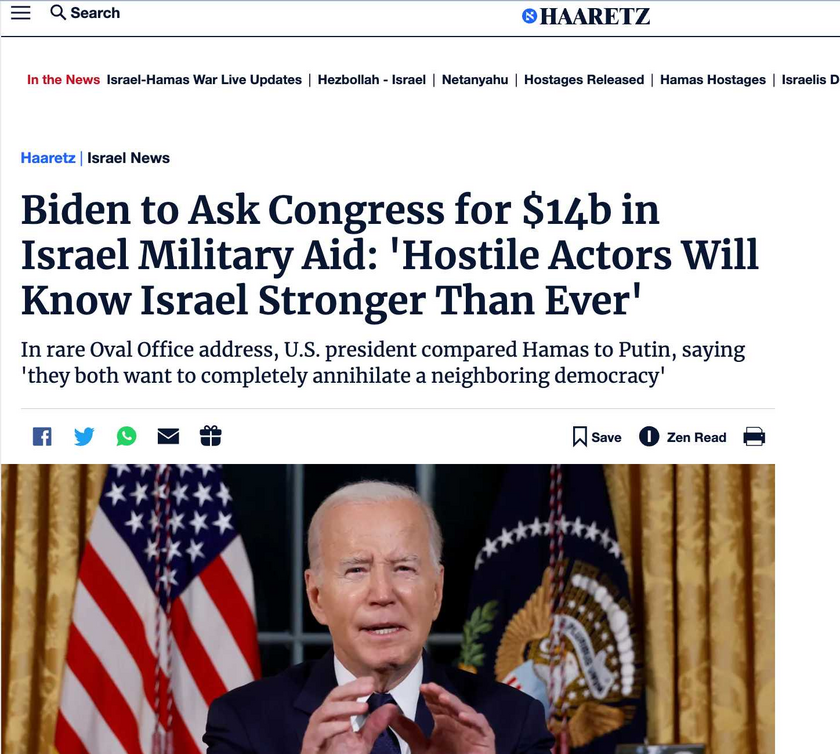
And many influential conservatives are now particularly scathing of the ongoing attempt to erode free speech rights in the U.S., and to impose various speech restrictions on American campuses and elsewhere, in the name of protecting Israel from criticisms and activism opposed to its actions. That is because the central principles embraced by the populist Right in the Trump era are squarely and irreconcilably at odds with the very consequential policies demanded by the Biden administration and their pro-Israel Republican allies.
This long overdue debate has been provoked by the refusal of many influential American conservative figures – former Fox News host Tucker Carlson, Daily Wire host Candace Owens, presidential candidate Vivek Ramaswamy, Rep. Thomas Massie (R-KY), and numerous MAGA influencers – to accept or endorse a long-standing, gigantic exception to key conservative principles that one may accurately call "the Israel Exception." For years, "the Israel Exception" has signified the demand of pro-Israel conservatives to abandon multiple ostensible defining political values in order to protect and finance Israel, and to impose repressive censorship and cancellations rules at home designed to punish or silence critics of this foreign country.
Long-standing lurking contradictions on Israel
In the abstract, none of this is actually new. It has been going on for years prior to October 7. I have written and spoken over many years about this Israel Exception in American right-wing politics. In December, 2022, we presented a SYSTEM UPDATE episode entitled "How Many Different Countries Should the US Now Be Fixing, Changing, and Interfering In?" Exploring the anti-intervention ethos and anti-war rhetoric that has become dominant in the Trump-era conservative movement, that show was designed to press the question – in light of pervasive right-wing animus to them – of how many different countries or entities the U.S. should view as an enemy worth fighting a war against.
In January of last year, we produced a separate episode entitled "The Right's Identity Politics: Exploiting Anti-Semitism to Suppress Debate and Defame Political Opponents." That program examined the long bipartisan history of suppressing speech in the U.S. in the name of protecting Israel.
At the same time that many on the Right profess that the U.S. must stop fighting and financing so many foreign wars and that neoconservatism is a toxic worldview, the list of entrenched foreign enemies maintained by many conservatives is as long as, and is often similar to, those of classic warmongers and neocons such as Bill Kristol, Sen. Lindsey Graham (R-SC), Nikki Haley, Sen. Marco Rubio (S-FL), and Liz Cheney. That Enemies List features, at the very least, China, Iran, Venezuela, Cuba, Qatar, Hamas, Hezbollah, Muslims in general and all enemies of Israel in particular. And, of course, establishment Republicans also regard Russia as an enemy in the same way that establishment Democrats do, which is why the U.S. has spent more than $100 billion to fuel a proxy war against it in Ukraine, with Washington poised to send $60 billion more to Kiev.
That is a long list of powerful enemies and a long list of potential wars. For many conservatives, anti-war and anti-intervention slogans seem appealing in the abstract. Yet the eagerness to view so many other countries and groups of people not merely as competitors of the U.S. but as threats and enemies to the U.S. ensures that each one of Washington's new proposed wars -- or proposed new proxy wars for the U.S. to fund -- will instinctively trigger ample right-wing support despite the rhetorical embrace of anti-intervention principles.
One of the defining historic attributes of the Trump presidency -- one the corporate media almost never acknowledges -- is that Trump was the first American President in decades not to involve the U.S. in a new war. He bombed and killed many people as part of the war against ISIS in Syria and Iraq that he inherited from the Obama administration, a war he vowed in 2016 to aggressively escalate and win. And he most definitely employed some of the nation's worst neocons and war hawks, including John Bolton, Nikki Haley and, most destructively of all, Mike Pompeo, whom he put in charge of the CIA and then the State Department. And his administration often ended up implementing policies that misaligned with his peace-with-Russia rhetoric, such as sending lethal arms to Ukraine after Obama (defying intense bipartisan pressure) largely refused to do so.
But the fact remains that Trump ran in 2016 on a vow to subvert and uproot decades-old bipartisan warmongering and interventionist foreign policy, including his distaste for NATO, the financing of other countries' wars, and both proxy wars and regime-change wars. Trump's 2016 attack on bipartisan DC foreign policy orthodoxy -- combined with Hillary Clinton's well-earned status as one of Washington's most stalwart champions of those wars and other forms of aggression and foreign interference -- was one major reason that the smarter neocons and the U.S. Security State recognized early on that Trump was such a grave threat to their agenda (indeed, many neocons -- including Victoria Nuland's husband, Robert Kagan, were maneuvering to support Hillary even before Trump emerged as a candidate). That is a major reason why, even before Trump was inaugurated, they did everything possible to sabotage him and have never stopped.
Early in 2016, Trump's anti-intervention and "America First" instincts led him to denounce what had become the American obsession with prioritizing Israel and mindlessly giving it everything it wants. In an MSNBC-hosted town hall in February of that year, Trump vowed to be what he called a "neutral guy" when it came to the Israel/Palestinian conflict, emphasizing the urgency for American national security of forging a two-state peace deal, something he said would be impossible to do if the U.S. continues to be perceived as being too much on Israel's side.
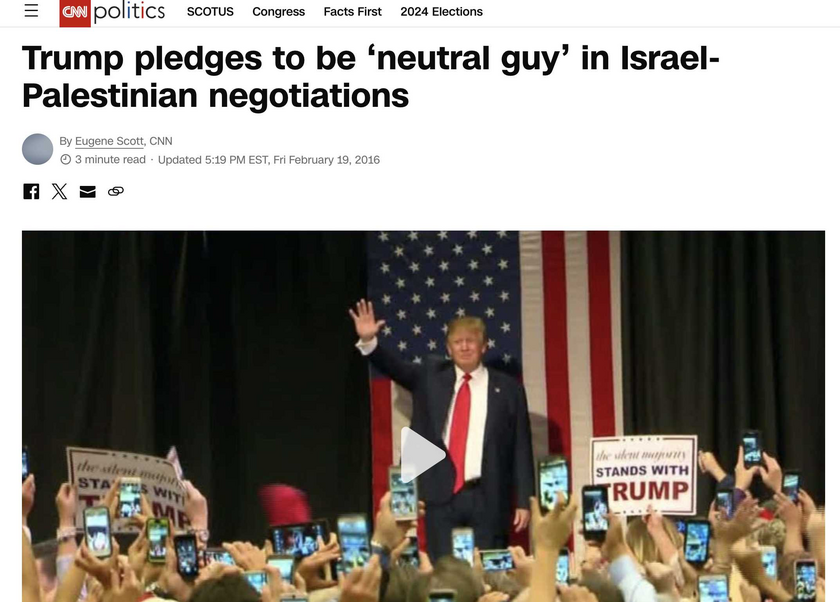
Trump's pledge of "neutrality" regarding Israel predictably created a major firestorm. Unquestioning support for Israel has long been a virtual religion in bipartisan Washington. Trump was attacked from every corner: Israel-obsessed neocons, Republican war hawks, and establishment Democrats.
Seeing the political danger from this issue -- Hillary strongly implied he was anti-Semitic and insufficiently loyal to Israel -- Trump quickly snapped into line during the 2016 campaign, giving one of the most pro-Israel speeches to AIPAC. Then, as President, Trump anointed his fanatical pro-Israel son-in-law Jared Kushner to run his Middle East policy, whereby Trump (with the support of senior Democrats including Chuck Schumer) ordered the U.S. Embassy moved to Jeruslam, once an idea confined to the radical pro-Israel fringes. But that 2016 episode exposed an obvious, politically uncomfortable tension between the America First foreign policy principles Trump was championing, and the bipartisan policy of prioritizing Israel's needs.
Trump did not, of course, invent these anti-interventionist sentiments within the American Right. But he gave voice to them, and became the most charismatic and effective political figure in decades to advocate them. Figures like Texas Congressman Ron Paul and, before him, senior Nixon, Ford and Reagan official Pat Buchanan, both attracted ample support as anti-establishment GOP presidential candidates by urging a more anti-interventionist foreign policy, principles which each of them explicitly argued cannot coherently accommodate a special exception for U.S. devotion to the Israeli government.
(Both of them, needless to say, were branded as anti-Semites). In the recent past, the most significant presidential attempts to impose limits on U.S. support for Israel came from Republican, not Democratic, presidents. In the early 1980s, President Reagan directly threatened Israel with a cessation of American aid if it did not stop various bombing and invasion operations against its neighbors in Syria and Lebanon, acts that Reagan regarded as not only reckless but as creating danger for American troops in the region.
Lou Cannon's 2014 book on Reagan recounts how the American President called then-Israeli Prime Minister Menachem Begin -- formerly a leader of the Israeli terrorist group Irgun -- and told him that the Israeli bombing of Lebanon was a "holocaust" that must end. Begin, scared of losing American aid, immediately complied.
When a U.S. Marine base in Lebanon was attacked by suicide bombers in 1983, killing 241 American servicemembers, Reagan refused to join in on attacks against Iran and others, and instead withdrew U.S. troops from Lebanon, reasoning that American involvement there -- originally designed in part to assist Israel -- was contrary to American interests.
The last significant defiance of America's Israel supporters came under the Bush 41 administration. In 1991 and 1992, President George H.W. Bush -- alongside his realist advisors James Baker (who was Reagan's Chief of Staff and Treasury Secretary) and Brent Scowcroft -- provoked a serious political controversy by threatening Israel that the U.S. would cut off $10 billion in American loan guarantees if Israel did not halt settlement expansions in the West Bank.
Bush, Baker and Scowcroft -- needless to say -- were widely vilified by the Nikki Haleys and Ben Shapiros of that time as being "anti-Semitic." And, exactly as happens now, those fanatical pro-Israel smear artists were joined in that vilification ritual by leading Democrats. Leading the attempts to smear Baker in particular as an anti-Jewish bigot was the always-opportunistic Bill Clinton. Clinton was preparing to run for president against Bush in 1992, and Clinton knew – as Richard Nixon pointed out very explicitly in a post-presidential interview – that America's Israel supporters do not tolerate any limits on American aid to Israel, no matter how much such limits are in America's interests.
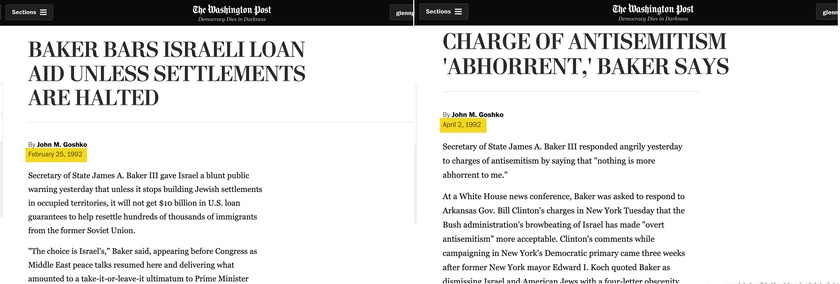
The Bush 41 administration argument was clear: namely, Israel is harming American national security by sabotaging a two-state solution with settlement expansions, which the U.S. had long opposed and still does. Why, Bush officials asked, should the U.S. should fund a foreign country as it engages in policies that directly engagers Americans: namely, subjecting American troops and other regional interests to attack due to anger over U.S-enabled denial of Palestinian statehood?
The reputational attacks on these Bush officials arguing this were severe. And Bush 41 was therefore the last American president to attempt to impose any real limits on U.S. funding and protection of Israel (Obama's last-minute abstention on a UN Security Council resolution to declare Israeli settlements in the West Bank illegal was more symbolic than substantive). This very acrimonious 1991 exchange between then-Secretary of State Baker and one of the most pro-Israel House members, the Florida Democrat Rep. Larry Smith, should seem very familiar to anyone paying attention now. The dynamic has never changed. Just look at the unique passion and emotion that this foreign country invokes among its American supporters:
The Israelis are very well-aware that American presidents are politically barred from placing any limits on their actions, even when the U.S. is funding Israel's various wars and its military. In 2001, Netanyahu was caught on video mocking the notion that American leaders could impede Israel's attacks on Palestinians, boasting of the ease with which he could marshall American public support in Israel's favor, against any presidential attempts to stand up to Israel.
Just this week, several of Israel's most extremist ministers explicitly said that Israel's goal in its current war was to ethnically cleanse Gaza of Palestinians. After the Biden White House announced that it opposes such an objective, Israel's Minister of Security, Itamar Ben-Gvir, mocked the U.S.'s attempt to impose limits on his country, saying: "we are not another star on the American flag."
This notion that Israel is not the 51st American state is one that is used by many Americans to oppose U.S. financing of Israel (just as it was used to oppose U.S. financing of Ukraine's war). Minister Ben-Gvir's decree would be a more convincing proclamation of Israeli sovereignty if not for the fact that this same Israeli government aggressively pressures the U.S. to pay of its miliary and for its wars. But this mentality -- the U.S. will pay for our wars and then has no right to object that our actions harm American interests -- underscores how bizarre it is that many (not all, but many) of the same people who parade under the banner of "America First" not only accept these Israeli commands but also eagerly pay for them.
Right-wing contradictions on Israel finally erupt
Despite the successful smearing of Bush 41 officials as anti-Jewish bigots, these glaring conflicts between stated right-wing ideological beliefs and America's unlimited and unconditional support for Israel have never disappeared. And that is why they have exploded within right-wing circles over the past twelve weeks.
What forced these contradictions into the light was the October 7 Hamas attack on Israel, and especially the subsequent decision by the Biden Administration and bipartisan Washington to immediately treat Israel's war in Gaza the same way it has been treating Ukraine's war with Russia: namely, by paying for Israel's war, arming it, and alienating much of the world whose support the U.S. needs in its commercial competition with China: massive costs Washington eagerly incurred all in order to "stand with Israel."
When Rep. Mike Johnson (R-LA) was elected Speaker of the House in October, he followed long-standing tradition by ascending to the House podium in order to unveil to Americans the the top priorities that his Speakership would pursue. After first decreeing that "the greatest threat to our national security is our nation's debt," he then announced that the very first bill the new Speaker intended to bring to the floor was not one to address the many problems of American citizens or to address that national debt. Instead, he said beaming with pride, the first bill would be one "in support of our dear friend Israel."
As a result of all of this, numerous influential conservatives have begun quite vocally objecting to this Israel Exception championed by many Republican lawmakers and conservative pundits. It provoked Daily Wire hosts Candace Owens and Ben Shapiro to trade acrimonious criticisms of each other in public. Congressman Massie appeared on our show last month to reveal the large spending now being done by AIPAC to recruit a Kentucky GOP primary challenger against him in order to remove him from Congress for opposing Biden's insistence that the U.S. fund Israel's war.
Presidential candidate Vivek Ramaswamy also told us that he opposes Biden's request for $14 billion in additional funds to pay for Israel's war, and separately warned conservatives in a Wall Street Journal op-ed to stop embracing censorship and cancel culture against Israel's critics in the U.S. Tucker Carlson, arguably the most influential media figure among American conservatives, has repeatedly noted, and objected to, many of these glaring contradictions on Israel.
But a particularly inflammatory interview given last Friday by Carlson to "Breaking Points" host Saagar Enjeti has now really ignited the intra-right debate. Among other things, the former Fox News host railed against the intense, singular and highly emotional fixation on this foreign country by Ben Shapiro and his fanatically pro-Israel allies. Carlson also condemned the complete abandonment of large parts of the American right's claimed belief in free speech since October 7 in favor of the suppression of Israel criticisms and the punishment of Israel critics in almost every sector of American life, including on college campuses.
Carlson's argument did not rest, as some pro-Israel extremists tried to imply, on the mere fact that Shapiro sometimes focuses on and speaks about Israel. Instead, Carlson's grievance is that Shapiro and many others demand that Americans bear the costs of Israel's military and its wars, even though millions of Israelis live better than millions of Americans. Here is Carlson in his own words:
Those comments – needless to say – instantly and very predictably provoked accusations of "bigotry" and anti-Semitism against Carlson from pro-Israel activists and various assorted neocons. The Patron Saint of Anti-Semitism Accusations, the ADL, has long demanded Carlson's firing from Fox News by accusing him of bigotry. And the ADL has long attempted to impose restrictions on campus speech in the name of various liberal causes but also in the name of protecting Israel. As has happened often since October 7, many conservatives now find themselves in alignment with the pro-censorship ADL.
A long-time complaint of conservatives against the American liberal-left is that they resort to bigotry accusations against their opponents in order to destroy reputations and stifle debates. That has always been an ironic grievance given that many pro-Israel conservatives, as their first tactic, hurl racism and biogtry accusations against their opponents more casually and aggressively than any purple-haired Social Justice Warrior at Oberlin that they claim to loathe.
Just as everyone knows they will be branded by liberals as a racist or Nazi for opposing, say, permissive immigration policies or affirmative action, everyone knows they will be branded by pro-Israel conservatives and various neocons as a bigot, Nazi and anti-Semite for criticizing the actions of the Israeli government or questioning U.S. financing of their wars. These two factions have far more in common, at least on a tactic level, than either likes to admit.
Bigotry accusations -- specifically anti-Semitism -- are and always have been the central tactic of America's most devoted Israel supporters. And there are few areas where this has worked more effectively than deterring, or sometimes even barring, American citizens from questioning why the burden falls on them to pay for Israel's wars and its military, and why the U.S. constantly sacrifices so much for this one single foreign country.
Imposing censorship and other speech restrictions in the U.S. to protect Israel
Beyond those foreign policy tensions lurking within the American Right, we have also often reported on the numerous censorship campaigns aimed at Israel critics in the West. These Israel-protecting censorship campaigns in the U.S. are, amazingly, often supported by some of the same right-wing or at least "anti-woke" figures who branded their lucrative media image around a supposed passion for free speech and free debate.
Indeed, the causes of political censorship and restrictions on campus speech have had no better moment than the last ten weeks in the U.S. Suffice to say, when it comes to domestic conceptions of free speech, language policing, victimhood narratives, "cancel culture" crusades, and mass firing of critics, October 7 has become the George Floyd moment of the pro-Israel wing of American conservatives.
The censorship and cancellation of Israel critics in the U.S. began almost immediately after October 7 and has shown no signs of relenting. Governor DeSantis actually ordered the banning of a pro-Palestinian student group from the University of Florida system: a move that the free speech group FIRE, long credible with conservatives, denounced as a flagrant violation of the First Amendment, since the crime of "material support for terrorism" requires more than mere speech. Major college administrators followed in DeSantis' path, with Columbia University, Rutgers and others simply banning or suspending a group of Jewish students who are pro-Palestinian, along with the campus group Students for Justice in Palestine.
In this week's interview with Enjeti, both he and Carlson once again expressed indignation at how readily and eagerly parts of the American Right are to sacrifice free speech for Americans, and impose classic censorship and cancellations tactics, in the name of punishing and silencing Israel's critics:
To illustrate how valuable Western censorship advocates see Israel as being for their cause: the EU just initiated its first ever formal investigation under its new online censorship law, the Digital Services Act, against Elon Musk's X. The primary charge is that X failed to censor enough anti-Israel or "pro-Hamas" content.
Some on the Right have tried to justify this speech suppression by falsely depicting it as some sort of new tactic designed to finally force the pro-censorship left to live under their own censorship rules. But that ignores the fact that — long before October 7 – Israel critics have been among the most frequent targets of American censorship and "cancellation" campaigns.
For years, I have reported on speech-abridging laws -- that came largely from red states, along with Democratic New York Governor Andrew Cuomo -- which banned American citizens from supporting a boycott of Israel as a condition to receiving contracts with the state. That law is such a full-frontal assault on the First Amendment's free speech guarantee that federal courts quickly and emphatically struck them down. To illustrate how twisted these laws are: an American citizen is free to boycott any other nation on the planet, or even to boycott other American states. The sole entity protected is Israel (indeed, Gov. Cuomo himself ordered a boycott of North Carolina and Indiana as punishment for trans/bathroom bills they enacted, while then barring anyone from boycotting this one foreign country).
As just one illustrative example of the extreme contradictions for free speech rights which this Israel devotion creates: Sen. James Lankford (R-OK) -- within one twenty-four-hour period in 2021 -- condemned the Biden administration for supporting censorship of political speech, but then turned around and demanded that Ben & Jerry's ice cream be banned from sale in Oklahoma due to its decision to no longer allow its product to be sold in the occupied West Bank. Censorship of American speech is apparently horrific to Sen. Landford, and to so many of his fellow conservatives, unless it is designed to protect Israel.
Pro-Israel censorship in the U.S. has been raging for years. On October 6 of this year – just one day before the Hamas attack in Israel – I tweeted this in response to a report that Israel supporters were angry at the University of Pennsylvania's President, the now-ousted Liz Magill, over her refusal to cancel a literary event featuring Palestinian writers:
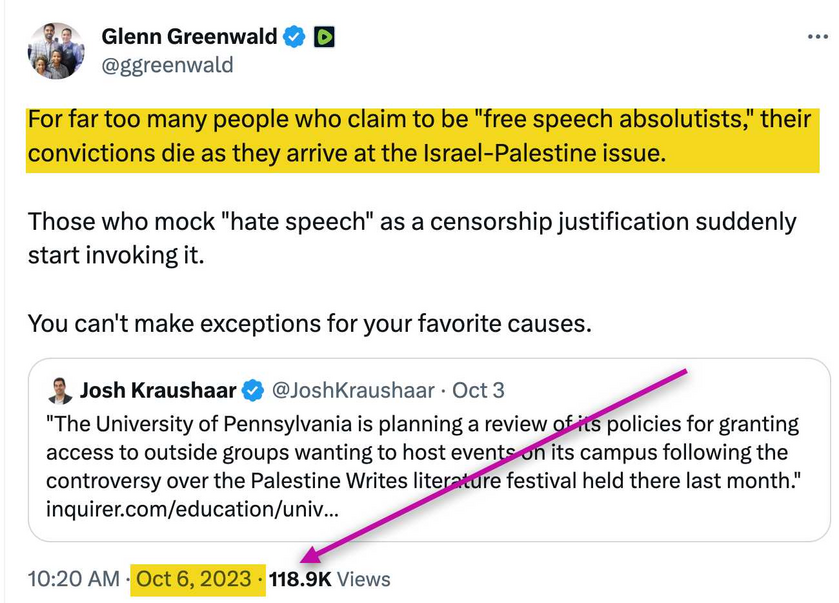
The Israel-protecting censorship craze – both before October 7 and especially after – has not been disguised. In September -- before the Hamas attack -- Israeli Prime Minister Benjamin Netanyahu instructed Elon Musk that Musk's professed belief in free speech absolutism must, when it comes to Israel, be "balanced" with the need to stop "hate speech": the most common left-liberal justification for censorship. In other words, the Israeli leader was demanding that the speech rights of American citizens be narrowed to shield this foreign country that he leads.
In 2019, Florida Governor Ron DeSantis championed and then signed into law a bill to heighten punishments for so-called "hate crimes." The entire concept of "hate crimes" was one long opposed in principle by many conservatives. who argue that committing violence is already a crime, and enhanced punishments necessarily for "hatred" require the monitoring by the state of speech and belief, i.e., they punish "thought crimes."
DeSantis emphasized that the primary goal of this new state law was to target anti-Semitism. But he did not sign the bill in Tallahassee: Florida's capital. instead, he signed the law governing the rights of American citizens in Israel, after a meeting with Netanyahu. Representing the dominant political dynamic, the ADL "applauded" Gov. DeSantis for both the bill and where he chose to sign it.
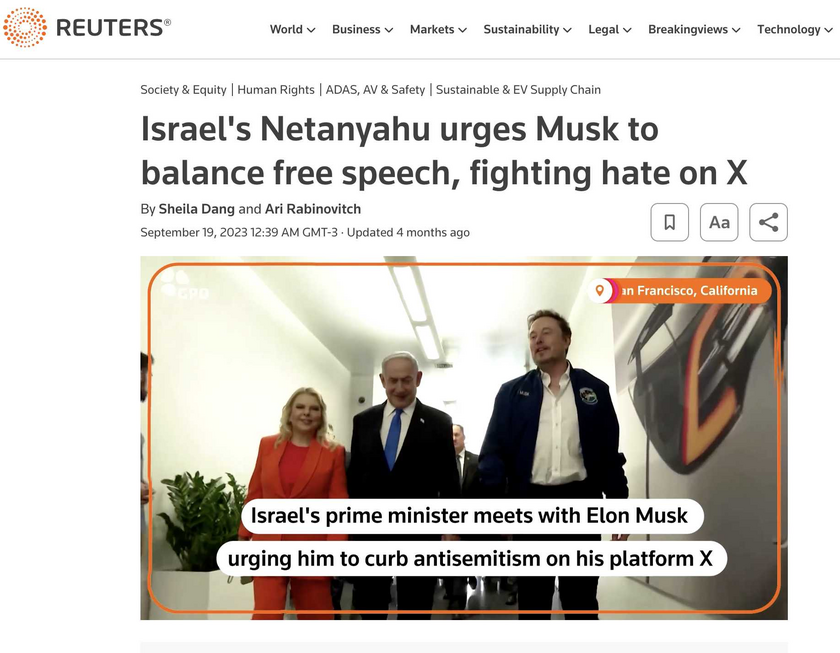
Since October 7, there has been no single individual more adored and cheered among pro-Israel Americans than Bill Ackman. Much of the pro-Israel Right cheered as the liberal American billionaire and hedge fund manager encouraged "no-hire" blacklists of American college students who criticized or blamed Israel for the conflict (not who praised Hamas). Pro-Israel groups then paid for trucks to drive around their campuses with their names and faces on them, while speakers blared accusations of bigotry. In November, we interviewed two Harvard undergraduate students who explained what was done to them for the crime of signing a statement blaming Israel for the larger conflict with the Palestinians: treatment far worse and more harassing than the vast majority of American Jewish Ivy League students have allegedly been "endangered" for their support of Israel.
Ordinarily Ackman, a mega-donor to Democratic Party candidates, would be the embodiment of everything the American Right claims to hate: a financier who enriched himself by betting on the collapse of the U.S. economy and hollowing out American companies, and who advocated COVID maximalism including shutting down the economy for a full month while enormously profiting from the failure of the U.S. economy.
Yet just as criticism of Israel overrides all virtues in the eyes of America's pro-Israel extremists, support for Israel cleanses all sins: that is what it means to say that Israel is the overarching priority for so many. And thus has Ackman received adulation from many conservatives as he leads the effort to cleanse American universities of Israel criticisms or pro-Palestinian activism.
Ackman's most significant coup so far was leading the effort to force the ouster of Penn's President Liz Magill and Harvard's President Claudine Gay; he now is working to remove MIT President's Sally Kornbluth. As we documented on Tuesday's show, what each of them has in common is not plagiarism or any other ethical transgression; the crime is that they defended excessively broad conceptions of free speech by correctly insisting that one must assess the "context" to know if speech critical of Israel crosses over into "advocacy of genocide."
In October, several Western European countries banned pro-Palestinian marches while still permitting pro-Israel marches: in other words, they outlawed protests against EU government policy toward Israel while allowing protests that supported government policy. As just one example illustrating the instant abandonment of professed principles in the name of Israel, Dave Rubin – who has become a very wealthy man by self-branding as a defender of free discourse and the right of dissent – did not just cheer this censorship of anti-war and pro-Palestinian protests, but heralded such censorship as the possible salvation of the West:
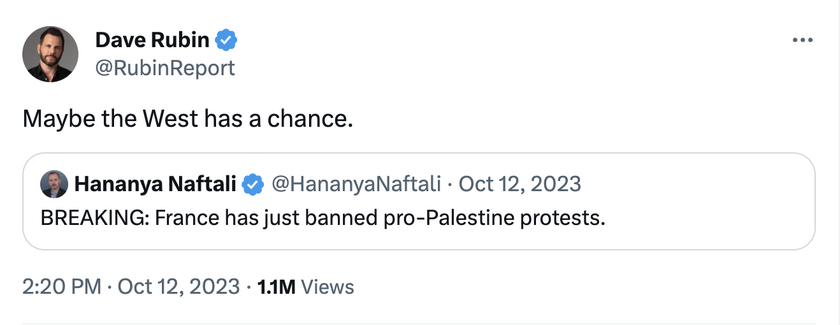
Websites and social media pages popular among pro-Israel conservatives hunted down the names of previously obscure American critics of Israel, and worked tirelessly – and often successfully – to pressure their employers into firing them. After Republican Congress members spent years denouncing the "politicization of the FBI" and "weaponization of the Security State," pro-Israel members of Congress such as Sen. Josh Hawley (R-MO) demanded that the DOJ "investigate" American student groups critical of Israel, labelling them "pro-Hamas" to justify these domestic witch hunts.
Pro-Israel conservatives have, again and again, embraced the defining pro-censorship theories of the American liberal-left to justify their silencing of Israel critics. One Republican member of Congress, Nick LaLota (R-NY) – a lawyer! – said last week, in order to justify the banning of harsh Israel criticism, that the First Amendment does not protect "hate speech," something he was forced to delete after he was told that this is the opposite of what the Constitution provides.
From the start, this has been the tactic of pro-censorship conservatives, and it is a mirror image of the prinicpal theories of pro-censorship liberals. They first take the pro-Palestinian views they wish to banish or punish, then define them as "racism" or "hate speech." Or they insist that long-standing political slogans – such as "Free Palestine" or "intifada" or "from the river to the sea" – have a secret meaning: kill all Jews everywhere. This is identical to the way liberals insist that right-wing speech on immigration, or affirmative action, or trans issues should be banned because such speech carries a secret, implicit message: commit genocide against Latinos, or black Americans, or trans people.
One can endlessly debate whether these phrases are actually designed to incite violence against Israelis or even Jews. Or one can point out that the defining document of Netanyahu's Israeli Likud Party contains the same phrase – "from the river to the sea" – to define what they mean by Greater Israel, even though nobody argues that Likud politicians should be silenced on this ground.
Those debates can and should be permitted. And that is the point. In America, people are entitled to free speech, to express their political views and opinions without limits: even about Israel. There is no Israel Exception to the First Amendment. Even if pro-Palestinian activists were calling for the elimination of Israel not through legal or political means – as they insist – but rather through the use of violence, that is still clearly protected free speech.
That advocacy of violence is protected speech in the U.S., and that there is no constitutional exception for Israel, should be too obivous to require discussion. Lindsey Graham cannot be prosecuted for urging that Iran be wiped off the map, nor can that view be banned at American universities. Nikki Haley cannot be prosecuted for screeching "finish them!" at Netanyahu as Israel makes Gaza uninhabitable in order to ethnically cleanse that land of Arabs, a policy many Israeli officials explicitly advocate, nor can that view be banned at American colleges. American supporters of Israel cannot be prosecuted for demanding that Gaza be "flattened" or "turned into a parking lot" or for chanting "kill them all" about Arabs. And pro-Palestinian advocates, which often includes Jewish students, cannot be prosecuted or have their views banned from American colleges because some fanatical Israel supporters decide that their criticisms of or hostility toward some foreign country goes too far or seems driven by hatred.
These principles are ironclad and sacrosanct. The U.S. Supreme Court has repeatedly ruled that the First Amendment even protects advocacy of violence. And beyond state power, the American Right has spent years denouncing attempts to condition employment or campus speech rights on adherence to political orthodoxy, denouncing such attempts as "cancel culture."
Yet in the wake of October 7, many American media and political figures have lost their jobs for the crime of signing pro-Palestinian petitions or even, in one case, re-tweeting an Onion article mocking indifference to the suffering of Palestinian civilians. We devoted an entire show last month to examining what those Americans who lost their jobs after October 7 actually said and did; contrary to those justifying their "cancellation," none defended Hamas' attack on October 7. Instead, they simply criticized Israel and/or urged more protection of Palestinian civilians through measures such as a cease-fire.
This proclivity to hurl accusations of bigotry in lieu of substantive debate is the primary means of attempting to vilify Israel critics. Yet it is exactly this tactic, when used by the American liberal-left, that has been the primary grievance of the "anti-woke" sector of media, as illustrated by this emphatically argued 2019 essay by Bari Weiss in the neocon journal Commentary which, in its title, urged: "Say No to the Woke Revolution!"
Throughout her manifesto, Weiss lamented that the left has given up on the virtues of debate and rational discourse, replacing it with a relentless stream of bigotry accusations, intolerance for opposing views, the primacy of identity as a measure of worth, and equating words and slogans with actual violence in order to justify banning them. She wrote:
So the tools themselves are not just replaced but repudiated. And in so doing, persuasion—the purpose of argument—is replaced with public shaming….
Ideas are replaced with identity. Forgiveness is replaced with punishment. Debate is replaced with de-platforming. Diversity is replaced with homogeneity of thought. Inclusion, with exclusion.
In this ideology, speech is violence. But violence, when carried out by the right people in pursuit of a just cause, is not violence at all. In this ideology, bullying is wrong, unless you are bullying the right people, in which case it’s very, very good.
In this ideology, education is not about teaching people how to think, it’s about reeducating them in what to think. In this ideology, the need to feel safe trumps the need to speak truthfully.
While all of that perfectly describes the worst of the liberal-left's post-George-Floyd behavior, it describes with equal vigor and accuracy the conduct of America's most fanatical Israel supporters in the wake of October 7 (and before).
Anti-woke conservatives – who spent years mocking claims of college students that they felt unsafe: oh, do you poor fragile snowflakes need a therapy dog and a security blanket because you feel threatened by views you have to hear? – finally found a minority group whose members they insist are so unsafe they need a wide array of special protections, including censorship, to shield them from trauma. Many Israeli and Jewish American professors who work at East Coast elite colleges repeatedly insisted that the narrative of Jewish victimhood on college campuses was being wildly exaggerated and melodramatized with the same goal as left-wing activists have when they do the same for other minority groups: to justify suppression of dissent.
But no matter: that roving bands of violent Muslims hordes and their Jewish leftist allies are roaming American college campuses chanting "gas the Jews" or "murder all Jews" became, despite being a total fabrication, unchallengeable Gospel. Republican and Democratic members of Congress joined together – as they always do when the topic is Israel – to parade Jewish Ivy League students before Congress to amplify and treat with the greatest sensitivity their tales of how unsafe they feel: not because anyone attacked them physically, but because they are forced to see pro-Palestinian student protests and hear political chants denouncing Israel's war in Gaza and its occupation of the West Bank.
But that, too, is nothing new. In 2014, after the University of Illinois offered a tenured position to Professor Steve Salatia, Jewish student groups and major donors demanded that offer be withdrawn after they found tweets in which Salatia had harshly condemned Israel's 2014 bombing of Gaza. As The New York Times reported: "Noah Feingold, a member of a pro-Israel student group, told The Forward" that their demands were justified on this ground: "It’s about feeling safe on campus." The university ended up paying Salatia close to $1 million to settle a lawsuit, but at least they successfully purged the college of Israel critics and prevented students from feeling "unsafe."
When it comes to Israel: words are indeed violence, provided the words cross some arbitrary line of what is deemed permissible criticisms. As free speech advocates have been telling the left for years, actual violence is already illegal. The only way to justify the criminalization or suppression of ideas is to deceitfully equate those ideas with violence. And few things are more dangerous than conflating political ideas, slogans and chants with actual violence.
While many on the pro-Israel right have also been adept at doling out this inspiring lecture on the need for free expression, many have been struggling to live under it, if they even try at all. And while many of them insist that they loathe the tactic of hurling racism and bigotry accusations to destroy the reputation of their opponents and shut down the possibility of debate and dissent, few are more practiced and skilled purveyors of this tactic than the pro-Israel sector of the American right.
Massive costs of Israel's full-scale dependency on U.S. largesse
That Israel is treated by the U.S. not as a foreign country but as effectively the 51st American state is nothing new. Israel, for decades, has received more American foreign aid than any other country by far. One of the last acts of President Obama before leaving office in 2016, with Vice President Biden in tow, was to agree to a record-breaking ten-year deal with Israeli Prime Minister Benjamin Netanyahu that, in the words of The New York Times, "provided an average of $3.8 billion a year over the next decade to Israel," which was "already the largest recipient of American aid." But for both Israel and its legion of vociferous U.S. supporters, even that is not enough.
When it comes to most American supporters of Israel, nothing is enough. Whenever Israel decides to bomb Gaza, as it has done countless times in the last twenty years, the U.S. supports those wars and pays billions more for them, too. When Israel bombs its neighbors, then the U.S. Government, as it did under President Obama and is again doing now, furnishes those bombs in real-time from its own stockpiles. As a result, images of American-furnished weapons landing in Gaza pervade the region, fueling not only anti-Israel anger but also anti-American hatred. And one of Biden’s first acts after his October 18 pilgrimage to Tel Aviv was to request an additional $14 billion in American taxpayer money.

A handful of prominent Israel supporters have urged that American aid to Israel end, on the ground that the aid restrains Israel from acting even more aggressively against its regional enemies. But the reality is that Israeli officials bargain hard to get this aid, and any American president who refused would be destroyed. And, as Biden is now showing, the billions given to Israel every year are virtually never used as leverage by the U.S. to demand anything.
Efforts to compare American aid to Israel with other countries are laughable. A November analysis by Axios revealed that "the U.S. is by far the biggest supplier of military aid to Israel, contributing around $130 billion since its founding." While much of that is now required to be used to buy weapons from U.S. arms dealers, "Israel is the largest recipient of U.S. foreign military financing, which has represented around 15% of the country's defense budget in recent years." U.S. aid to the Palestinians, by contrast, totaled $150 million in 2022: or 25 times less than what Israel receives at a minimum each year.
All of this happens while many Israelis enjoy a higher standard of living, and greater health and educational benefits, than millions of Americans. Israel touts a universal health care system, along with highly subsidized and far cheaper college for Israelis than American citizens have. The life expectancy of an Israeli is at least five years higher than that of the average American.
Beyond using American resources to pay for Israel's war, the Biden administration has used the American veto power at the U.N. to completely isolate itself from almost the entire world. As news outlets around the world -- and in Israel -- document the staggering and unique destruction of civilian life and infrastructure in Gaza, including Israel's deliberate use of starvation as a weapon, most of the world has turned against the Israeli war.
Biden has ignored not only overwhelming world opinion but also domestic opinion. A majority of Americans in all groups from the start has favored a cease-fire.
Despite all that, the U.S., in vote after vote at both the Security Council and the General Assembly, has increasingly stood against the entire world in order to protect Israel. The U.S. is now down to a vanishingly small number of largely irrelevant countries as its allies – really just a handful of tiny island nations – in defense of Israel's war.
At one of the last votes on this conflict, a December 19 resolution to affirm the right of the Palestinians to self-determination, only four countries on the planet voted NO: Israel, the U.S., and two Pacific islands called Micronesia (population 113,000) and Nauru (population: 12,000). Only ten other countries abstained: the largest of them being Paraguay and South Sudan. That means that all 172 other countries, from the U.S.'s largest allies in Europe and Asia to South America and Africa, stood opposed to the U.S. and Israel.
Some right-wing discourse has bizarrely instructed Americans to believe that anything that happens "at the U.N." is irrelevant and likely corrupt. But "the U.N." is not some mystical leftist entity or a Soros-funded NGO. It is nothing more or less than the collective policy views of the world's governments. So when the U.S. stands against the world to support Israel, it is not standing "against the U.N." but rather against every country on earth, including almost all of its allies.
This isolation carries real and tangible costs to U.S. interests. As hard-core anti-China and anti-Russia hawk Fiona Hill, a former Trump White House official, warned in a speech to European foreign policy elites last June – in a speech we extensively covered at the time – nothing is strengthening China more than the US's alienation of many of the planet's governments and populations, which now see the U.S. as singularly responsible for so many destructive wars, coups and dictatorships around the world.
The specific dangers to the physical security of American citizens from the U.S.'s singular support for Israel's wars are obvious, in large part because it is the U.S. Government itself warning of them. Ever since Biden's trip to visit Netanyahu and his promise of unlimited financial support, the Biden State Department has warned American citizens on multiple occasions that they face heightened dangers of anti-American violence and terrorism anywhere they go in the world.
All of that is consistent with the repeated warnings over many years from top U.S. military officials that one of the primary causes of anti-American hatred in the region – and thus a key driver of the risks of anti-American terrorism at home – is the accurate perception that it is the U.S. that single-handedly enables Israeli aggression and wars against its Muslim neighbors (each time a military official issues this warning, as Gen. David Petraeus did among others, the ADL denounces them). Back in 2010, the chief of Israel's Mossad warned that Israel was becoming a "burden" to the U.S. Just one month before the October 7 attack, another former Mossad chief warned that Israel was now an "apartheid" state and was thus isolating itself from the world.
So for so many reasons, and on so many levels, it is impossible to reconcile claims of putting "America First" with the Biden administration's multi-pronged and very aggressive support for Israel and its wars. This is true for the same reason that so many self-identified "America First" or MAGA adherents – including many I interviewed over the last two years – emphatically explained why they opposed Biden's similar decision to fund and arm Ukraine in its war against Russia.
MAGA guest after MAGA guest, including several in Congress, told me when opposing the U.S. role in Ukraine that the U.S. has too many problems at home and is already drowning in too much debt to fund Ukraine's wars, adding that Ukraine "is not the 51st American state." Yet every time I asked whether this same rationale applies to Israel, they hemmed and hawed and stumbled to insist that Israel was somehow different, in part because they see Israel as being of singular importance and/or because they know that a refusal to support Israel means political or reputational death.
If one is comparing which country is an actual "ally," then one could make a far stronger case for Ukraine (which for years has done everything it is told by Washington) than one could for Israel (which continues to engage in the exact conduct the U.S. warns is harming American security). But there is no coherent explanation under Trump-era conservative politics for why Americans should be forced to fund the wars of either.
The explanation for these inconsistencies is self-evident to any honest person, no matter how potent the taboo constructed around it. For so many Americans, Israel is most definitely not just a foreign country. For deeply held religious and cultural convictions with which they have often been indoctrinated from birth – whether it be some strains of evangelical Christianity, or Zionism among American Jews, or just a generalized animosity toward Muslims that causes some to see Arabs as a sub-humanized horde – Israel resides on a special, elevated and unique pedestal that requires the U.S. to devote enormous resources of its own citizens to funding and protecting it.
But whatever that mentality is, it has nothing to do with American nationalism let alone an "America First'' framework for governing political choices. And that is why it was only a question of time before these lurking, glaring internal conflicts in American conservatism finally erupted.





















